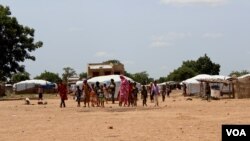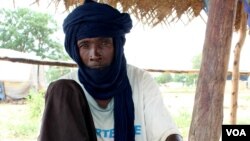SAG-NIONIOGO CAMP, BURKINA FASO —
As hundreds of thousands of displaced Malians begin returning to their homes in the north, post-conflict ethnic reconciliation remains a key challenge for officials in Bamako.
But at the Sag-Nioniogo refugee camp in central Burkina Faso, where an ethnic patchwork of uprooted northern Malians have found ways to get past the tensions and live in harmony, divisions over the question of an independent northern Mali persist.
The Tuareg rebellion that began in January 2012 was fueled by strong ethnic and communal undercurrents. After it was hijacked by jihadists drawing from regional Arab and Tuareg communities, as well as members of Peul and Songhoy ethnic groups, hundreds of thousands of civilians from all these communities were forced to flee the violence and rising communal tensions.
When 25-year-old Mohammed arrived at Sag-Nioniogo in September 2012, he was expecting to be among fellow Tuaregs.
“When I first saw that Songhoy were living in the refugee camp as well, I remembered all the difficult times in Mali," he says, explaining that he thought the recurring conflicts and bad history between the groups would make it impossible to live side-by-side.
Amid name-calling, accusations and displays of petty grievance — Tuaregs refusing to buy items such as bread from Songhoy sellers and vice versa — each ethnic groups, says Mohammed, set up shelters in different parts of the camp.
For aid agencies that support and research refugee camps, it was nothing new. Last month, for example, Britain-based Oxfam reported that six out of 10 people surveyed in Burkina Faso's two largest Malian refugee camps said they “have a problem with an entire ethnic group.”
But for Mohammed, things at the much smaller Sag-Nioniogo seemed to change subtly. While at first he did not associate with the Songhoy, he says, he began making Songhoy friends in the food distribution areas, slowly realizing how the different groups face the same problems.
Other Sag-Nioniogo residents agree that tensions began to ease. Beder Mohammed, one of the camp's few Arabs inhabitants, says he has even become hopeful about prospects for broader northern reconciliation.
"The groups each came for different reasons, with different problems, but in the camp the only choice was to get along and help one another, while also praying for peace," he said.
Although Malian government officials and MNLA Tuareg separatists are expected to initiate peace talks by the end of 2013, the 2012 crisis represents the fourth major Tuareg rebellion since Mali's 1960 claim of independence. The question of greater autonomy or independence for Mali's restive north remains a sensitive one, and many remain divided over exactly what long-term reconciliation would entail.
For refugee Bouj-kalin Ag Agrad, prospects for reconciliation remain dim. Talks, like fighting, he says, have only failed.
"You must divide the country to have peace, like how the problems were resolved in Sudan," he says.
While Tuaregs comprise an 80 percent majority of the Sag-Nioniogo population, they are a minority in Mali's underdeveloped north, where broad-based support for independence remains elusive. Many northerners continue to blame the Tuaregs for the ongoing instability, calling their latest rebellion the one that paved the way for foreign-led Islamists.
For refugee Mohammed Niane, although dialogue may quell tensions in the north, development is the key to stabilization.
"There is a big difference between the north and the south," he says. "The north needs investment in school, infrastructure, in everything. If there is no development of the north, there is no progress in solving the problem and so it will always come back."
Malian President Ibrahim Boubacar Keita has so far ruled out any division of the country, saying the solution is development through improved government decentralization.
But at the Sag-Nioniogo refugee camp in central Burkina Faso, where an ethnic patchwork of uprooted northern Malians have found ways to get past the tensions and live in harmony, divisions over the question of an independent northern Mali persist.
The Tuareg rebellion that began in January 2012 was fueled by strong ethnic and communal undercurrents. After it was hijacked by jihadists drawing from regional Arab and Tuareg communities, as well as members of Peul and Songhoy ethnic groups, hundreds of thousands of civilians from all these communities were forced to flee the violence and rising communal tensions.
When 25-year-old Mohammed arrived at Sag-Nioniogo in September 2012, he was expecting to be among fellow Tuaregs.
“When I first saw that Songhoy were living in the refugee camp as well, I remembered all the difficult times in Mali," he says, explaining that he thought the recurring conflicts and bad history between the groups would make it impossible to live side-by-side.
Amid name-calling, accusations and displays of petty grievance — Tuaregs refusing to buy items such as bread from Songhoy sellers and vice versa — each ethnic groups, says Mohammed, set up shelters in different parts of the camp.
For aid agencies that support and research refugee camps, it was nothing new. Last month, for example, Britain-based Oxfam reported that six out of 10 people surveyed in Burkina Faso's two largest Malian refugee camps said they “have a problem with an entire ethnic group.”
But for Mohammed, things at the much smaller Sag-Nioniogo seemed to change subtly. While at first he did not associate with the Songhoy, he says, he began making Songhoy friends in the food distribution areas, slowly realizing how the different groups face the same problems.
Other Sag-Nioniogo residents agree that tensions began to ease. Beder Mohammed, one of the camp's few Arabs inhabitants, says he has even become hopeful about prospects for broader northern reconciliation.
"The groups each came for different reasons, with different problems, but in the camp the only choice was to get along and help one another, while also praying for peace," he said.
Although Malian government officials and MNLA Tuareg separatists are expected to initiate peace talks by the end of 2013, the 2012 crisis represents the fourth major Tuareg rebellion since Mali's 1960 claim of independence. The question of greater autonomy or independence for Mali's restive north remains a sensitive one, and many remain divided over exactly what long-term reconciliation would entail.
For refugee Bouj-kalin Ag Agrad, prospects for reconciliation remain dim. Talks, like fighting, he says, have only failed.
"You must divide the country to have peace, like how the problems were resolved in Sudan," he says.
While Tuaregs comprise an 80 percent majority of the Sag-Nioniogo population, they are a minority in Mali's underdeveloped north, where broad-based support for independence remains elusive. Many northerners continue to blame the Tuaregs for the ongoing instability, calling their latest rebellion the one that paved the way for foreign-led Islamists.
For refugee Mohammed Niane, although dialogue may quell tensions in the north, development is the key to stabilization.
"There is a big difference between the north and the south," he says. "The north needs investment in school, infrastructure, in everything. If there is no development of the north, there is no progress in solving the problem and so it will always come back."
Malian President Ibrahim Boubacar Keita has so far ruled out any division of the country, saying the solution is development through improved government decentralization.





